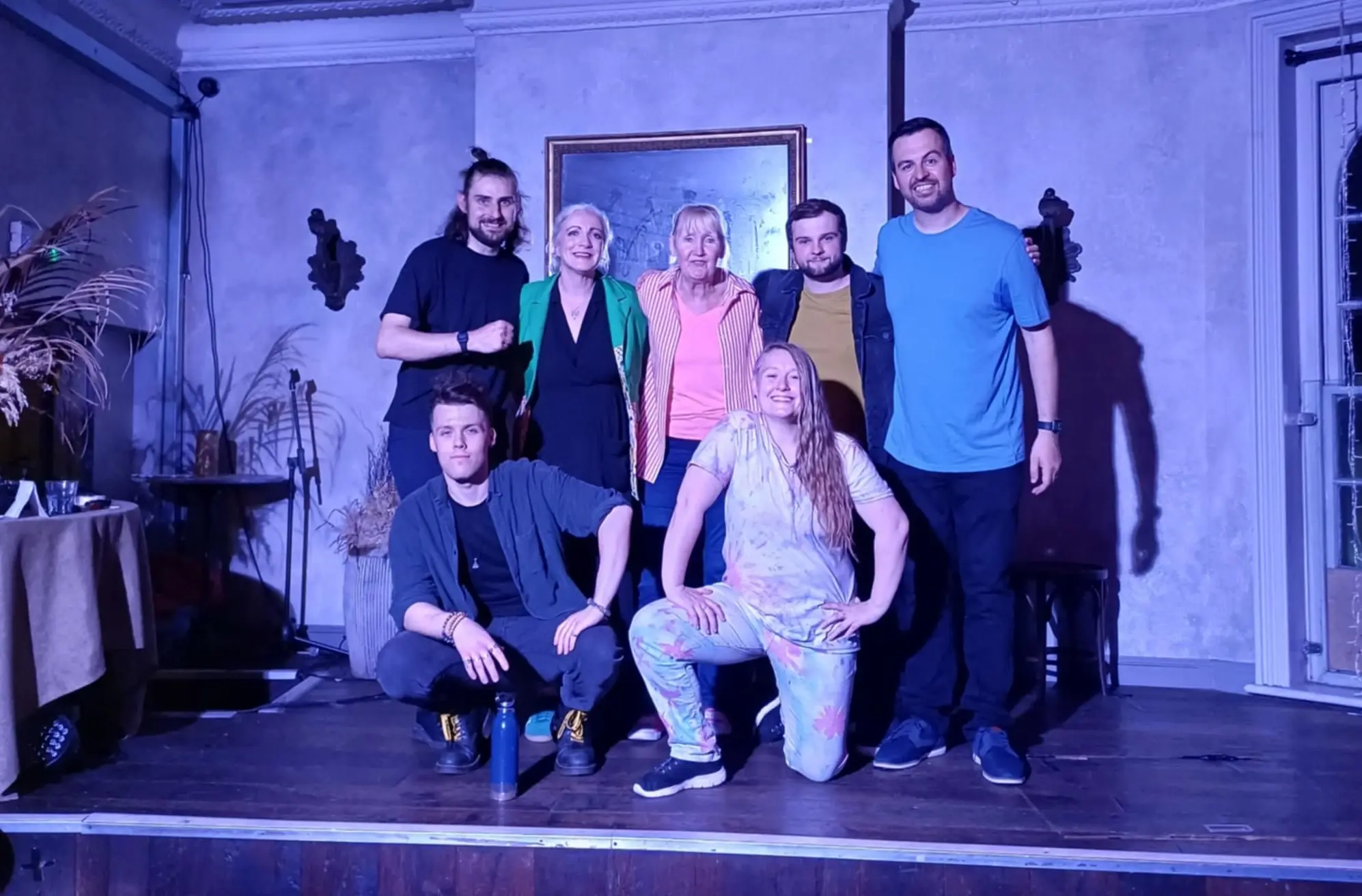Yes And...
How Improv taught me to be a better leader.
On Friday night, I performed an improv comedy murder mystery at the Brighton Fringe as part of the troupe "Who Killed The Plot". We played to a sold out audience who had paid £8 each to be there. The audience really vibed with our comedy and the show went better than any of us could have expected.
 On stage at the Brighton Fringe
On stage at the Brighton Fringe
I've had an interesting journey to get to this point. Two years ago, I had never done any improvised speaking before. I never did drama or music at school. I had been on stage to deliver multiple rehearsed technical talks - but the thought of being on stage without the safety of a script or a powerpoint deck terrified me. Now I'm quite happy to get on stage to speak, act, sing an improvised song or even do some freestyle rap.
I originally started going to improv to improve my confidence when speaking to investors. I wanted to feel confident when I was talking about what we were doing at Bloom without needing to stick to a script. I found an improv community near where I live called Dingbats Improv and decided to go along. From the very first workshop I realised I had found something that was fun, a great way to remove any stress from the day and completely different from anything else I'd ever done.
As well as being a lot of fun, Improv has taught me many life skills and ways to be a better leader, a better partner and a better person:
Yes And
"Yes And" means accepting your scene partners offer and building upon it. You wanted your scene partner to feel supported, and you want to make them look as good as possible on stage.
As a leader, this same technique applies to building a strong team. When the team have suggestions it's important to value their contribution and then expand or redirect, rather than shutting them down. This creates a culture where people feel heard and have psychological safety - which results in more creative problem solving and more willingness to share innovative ideas.
For example, if an engineer suggests a change in process or architecture it may not be the right timing now, but there may be an element that you can start incorporating early on and schedule time to review the remainder at a later date. This will preserve their enthusiasm while acknowledging the current constraints. Later on, when you do the comprehensive review, they will be even more engaged because they saw that their input genuinely mattered.
Confidence
Improv requires performers to make bold choices without hesitation. If you wait too long to make a choice, the moment has passed and you have missed the laugh. Improv teaches you to trust your instincts and fully commit to the decisions you make.
In leadership, it's very easy to put off a decision or end up in analysis paralysis. Without hindsight, it's often impossible to know what is the right choice - we are just left with best guesses. We have to instill confidence in our team to take chances with decisions and.. embrace failure.
Embrace Failure
In Improv, mistakes are often celebrated as opportunities. Often the funniest laughs come from when things go wrong - like when someone badly mimes an action or something unexpected happens.
In technology, things also go wrong from time to time, and while it's not funny when it happens in the world of work, having the ability to remain calm and reframe failures is crucial. Think through how a failure can become an opportunity to make something greater.
Creating a team environment where people aren't afraid to fail encourages innovation and experimentation. When team members know that an unsuccessful attempt won't be met with blame but rather with curiosity and support, they're more willing to propose bold ideas and take calculated risks. Just make sure you are learning from your failures and building those lessons into your process.
Active Listening
Improv scenes rely on truly listening to your scene partners rather than waiting to speak. In leadership, this means giving full attention to the team and the problems you are trying to fix. Being present in conversations, asking clarifying questions and responding to what's happening rather than sticking to the path you originally thought was best. Active listening will help you build stronger relationships with your team and lead to making better decisions.
Reading the Room
As an improviser, you need to have awareness of everything that is going on on-stage. Having an understanding of group dynamics and your teams' emotional states is also an important skill of being a leader.
Quite often when we make a decision as a group we may have a developer or designer who says they are ok, but actually they are unhappy with the decision that has been made. Perhaps they have some concerns with the approach, or a better understanding of how to be successful, or maybe they don't believe in the idea yet. Being able to sense those moments will allow you to hone in on these situations and ultimately lead to better team dynamics and leadership.
Storytelling
Having to make stories up all the time on stage lends itself well to being able to tell narratives in the work place. It's helped me develop my skills in communicating my vision and explain the story about the technology solutions we are building. It's changed how I can communicate with non-technical stakeholders and how I can inspire others.
Hopefully this article has given you some insights in to how Improv has helped me improve, and how these ideas relate to being a better leader. Maybe it has sparked your curiosity in to trying some of these techniques yourself. There are many improv workshops and classes out there, just a Google away. Good luck!
And if you are already in an Improv group - try my improv suggestion generator!
Related Blog Posts
Remote-First Engineering at Scale
The pandemic in 2020 changed the world of software development forever, with teams forced to work remotely.
Aligning Leadership Values
How do you align your leadership team when it feels like everyone is working in a silo?
